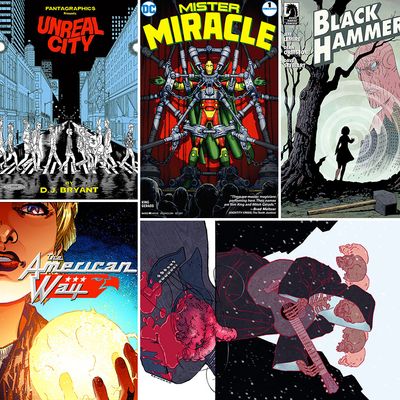
Each month, Abraham Riesman offers recommendations of comics, including book-length graphic novels, comics-format nonfiction, and ongoing series. With any luck, at least one of them will be a match for you.
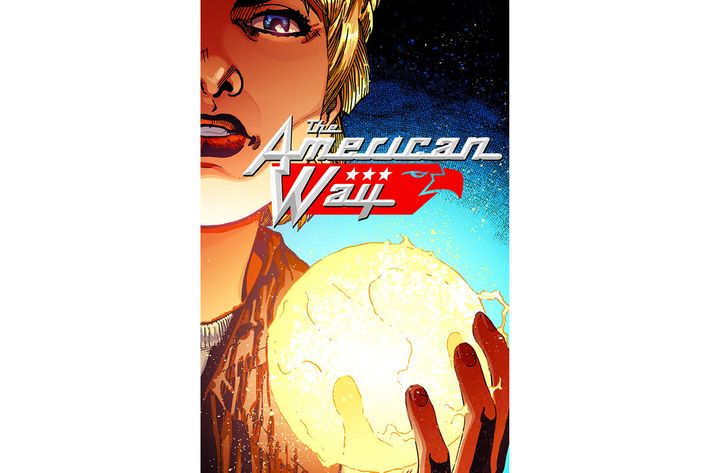
American Way: Those Above and Those Below by John Ridley, Georges Jeanty, Danny Miki, and Nick Filardi (DC)
Eleven years ago, a relatively unknown writer named John Ridley had an odd idea for a comic book: Intrigued by the real-life story of LBJ’s attempt to get a black man into the roster of Mercury astronauts, Ridley and penciler Georges Jeanty envisioned The American Way, a tale in which a government-sponsored superhero team in the early ’60s gets a black member. The resulting story of dashed idealism and variegated forms of racism was a stunning and under-appreciated landmark of the aughts. Since its publication, Ridley has become a bold-faced name, showrunning American Crime and, most famously, winning an Oscar for writing 12 Years a Slave. Now, in a delightful surprise, Ridley and Jeanty are back at it, putting out a sequel titled American Way: Those Above and Those Below. It picks up in the early 1970s and has so far spoken with eyebrow-raising directness about the racial earthquakes of that era, with its competing visions of black advancement and evolving mechanisms of racist reaction. The story’s also just a cracking good superhero yarn — Jeanty is at the height of his powers here — and makes you wonder just how much smarter superhero cinema might be if Ridley tackled a cape-and-cowl flick or two.
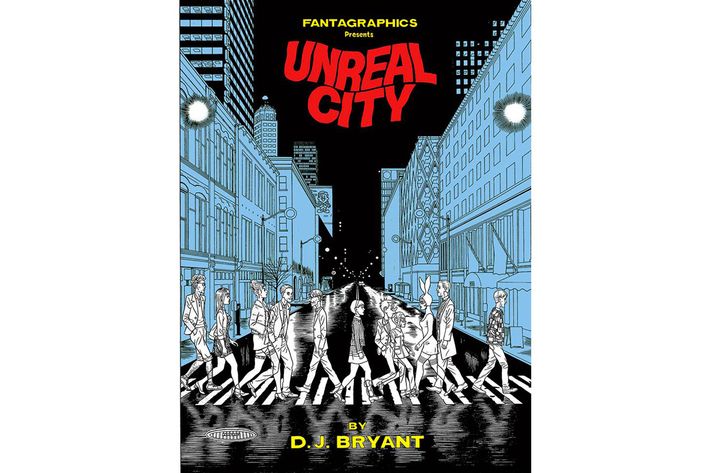
Unreal City by D. J. Bryant (Fantagraphics)
It’s been said that you should never bore people by telling them what happened in your dreams, but rising cartoonist D. J. Bryant seems to have resolutely ignored that advice — and we’re the better for it. In Unreal City, Bryant presents the reader with a series of vignettes about relationships, all of them notably off-kilter. Time operates like a physical space, identities blur into one another, and a character appears who resembles Bryant himself, but claims to be unable to draw; the oddities roll out in a torrent. The stories are, as you might expect, a bit of a challenge to follow, but as good a narrative craftsman as Bryant is, his real talent lies in his pencils and inks. Good lord, is this a pretty book to look at. There are obvious comparisons to be made with titans such as Daniel Clowes and Charles Burns, but Bryant is clearly pushing himself toward a wholly unique style in his layouts and facial acting, and it will be a thrill to watch how he proceeds after this surreal debut.
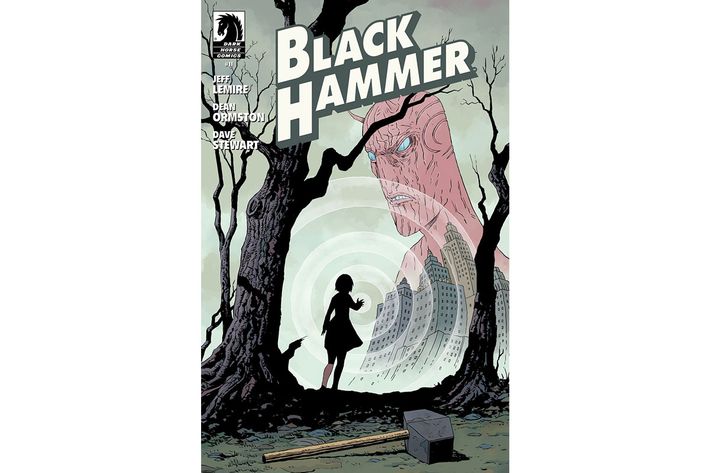
Black Hammer by Jeff Lemire, Dean Ormston, and Dave Stewart (Dark Horse)
There’s been a disappointing, but understandable, drift away from superhero fiction in creator-owned comics these days. Time was, if you made your bones doing superheroes at Marvel or DC, you jumped ship to an indie publisher and kept doing tights-and-capes work, albeit with fewer limits and greater creative control. Nowadays, everyone leaps to other genres when they have a chance. That’s fine, but it makes stuff like Black Hammer all the more vital by comparison. Jeff Lemire, Dean Ormston, and Dave Stewart have crafted a fascinatingly idiosyncratic superhero tale for Dark Horse, one that follows a group of meta-humans who find themselves trapped in a small town where they have to keep their powers under wraps. The whys and wherefores of the situation are kept deliberately ambiguous at the outset, so I won’t spoil anything, but suffice to say that Lemire has just the right mix of reverence and critique to make Black Hammer a minor revisionist masterwork.
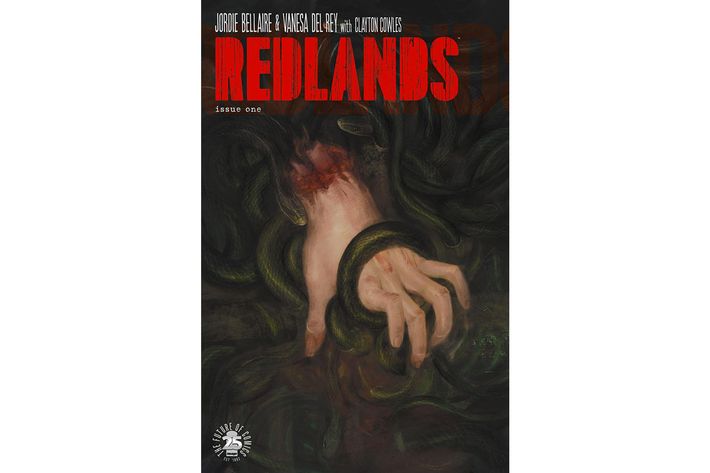
Redlands by Jordie Bellaire and Vanesa R. Del Rey (Image)
“Hey you” — reads a postscript in the first issue of Redlands — “the rebellious preteen holding this age-inappropriate comic in your hands, with your self-dyed hair, chipped fingernail polish, and dirty, duct-taped chucks — this book is for you.” Indeed. Redlands is only just now launching, but it already feels like a harkening back to the old Vertigo comics that one would surreptitiously check out from the library and gaze at with scandalized awe. I won’t ruin the plot, but so far the story involves vengeful women with destructive powers, a racist cop getting his comeuppance, a horrifying apparition in the dark, and an overall sense of in medias res dread that is sorely lacking in first issues of comics these days. To be perfectly honest, I’m not entirely sure what’s going on in Redlands just yet, but I’ve got a good (bad) feeling about what’s coming next.
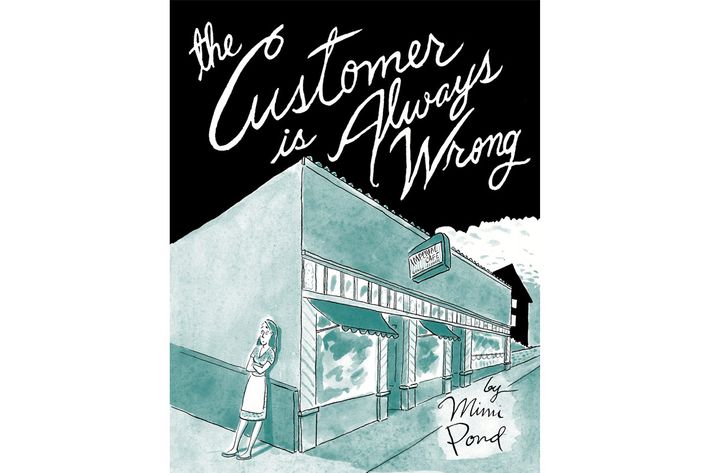
The Customer Is Always Wrong by Mimi Pond (Drawn + Quarterly)
Mimi Pond is a treasure, one we ignore at our own risk. Decades ago, she left her mark on television by penning the first episode of The Simpsons and writing for beloved institutions such as Pee-wee’s Playhouse and Designing Women, but her greatest contributions to popular culture have been her cartoons and illustrations. She’s created pieces for an array of publications and periodicals, but her latest book — a thick, semi-autobiographical bildungsroman called The Customer Is Always Wrong — might be her greatest work to date. It’s a lengthy and detailed portrait of a young woman working at a restaurant in late-’70s Oakland and the cast of characters around her — some of them shady, some of them lovable, and all of them compelling. Pond’s hand is confident and her figure work hops balletically across the page; her facial acting is simple, but searing. It’s a long journey from page one to the end, but you’ll be glad you stopped by for a cup of coffee or two with the folks Pond conjured up.
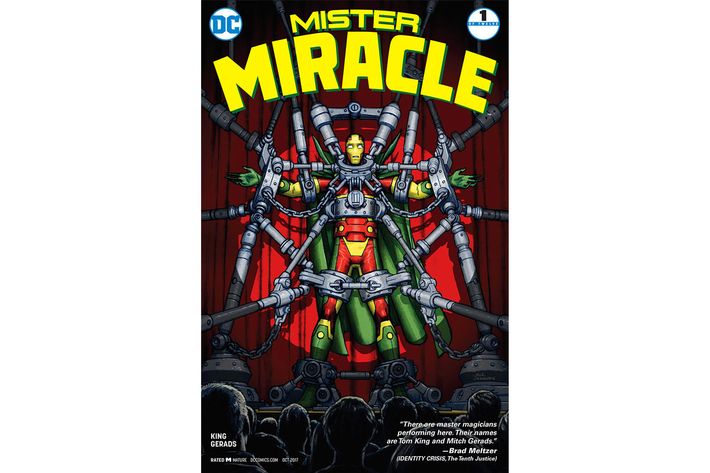
Mister Miracle by Tom King and Mitch Gerads (DC)
August 28 would have been the 100th birthday of Jack Kirby, the most influential creator in the history of the American comic book. After co-creating the Marvel Comics pantheon — Captain America, the Avengers, the X-Men, the Hulk, Thor, Black Panther, and countless more — Kirby moved over to rival DC Comics in 1970, and promptly invented a new cosmology of characters and concepts called Fourth World. One of its foremost figures was a superpowered escape artist named Scott Free, aka Mister Miracle. In honor of Kirby’s centennial, DC has whipped up a new series about Scott — and hoo, boy, the first issue is a humdinger. Tom King is arguably the finest writer in superhero comics today; Mitch Gerads is a penciler, inker, and colorist par excellence; and their teamwork here is nothing short of stunning. This first chapter is a jaw-dropping meditation on depression, grief, ambition, confusion, and mission, and it’ll be a treat to see how Scott breaks his way outta this one.
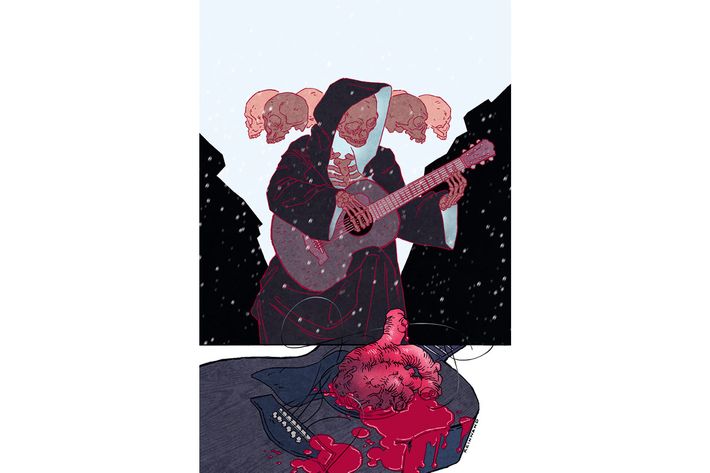
Murder Ballads by Gabe Soria, Dan Auerbach, Robert Finley, Paul Reinwand, Russ Badgett, and Chris Hunt (Z2)
As a comics-obsessed child raised by a blues-obsessed father, I feel as though I’ve been waiting my whole life for Murder Ballads. It’s a multimedia project that consists of a taut and intense graphic novel by an array of creators, accompanied by a five-song EP by musicians Dan Auerbach and Robert Finley — and it really kicks. The narrative portion involves a shitty white guy with aspirations of success as a music-industry A&R man who runs into a pair of exceedingly talented, young black blues musicians and proceeds to try to get a record together. They cross paths with an insane, drug-addicted, vaguely racist producer and things very quickly go pear-shaped. The comic doesn’t waste a single panel, and writer Gabe Soria knows how to pace the whole endeavor like a bat out of hell. The artwork drips with synesthetic musicality, but you don’t have to imagine just how good the notes sound — you can download the EP and hear some truly kick-ass tracks. With all of blues music’s larger-than-life personalities, half-true fables of aspiration and failure, and pulpy directness, it’s a wonder there haven’t been more comics about it. Here’s hoping this is a prelude to many more.
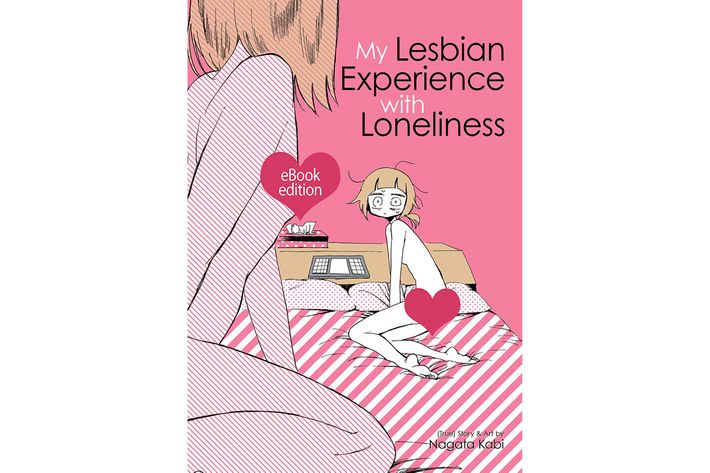
My Lesbian Experience With Loneliness by Kabi Nagata (Seven Seas)
First off, let’s just appreciate how amazing a title My Lesbian Experience With Loneliness is. It scans a bit like a poor translation from Japanese (and it is, indeed, a translation from Japanese, given that this book first found its fame there and has just recently been published in the U.S.), but it’s also an entirely accurate description of the book’s contents. It follows the life of the author, a woman with deep mental-health issues involving food, self-worth, and her mother. In page after page of compellingly crude artwork, we see her struggle to figure out how, exactly, she can function in society, and how to get over her crippling terror of intimate contact. She eventually concludes that her best bet is to try an appointment with a female sex worker, and the self-discovery that follows is utterly fascinating. Given everything I’ve just written, you could easily assume that the book is a brooding downer, but it’s actually quite hilarious.

